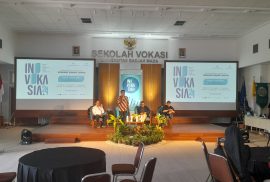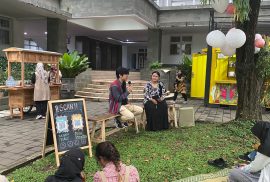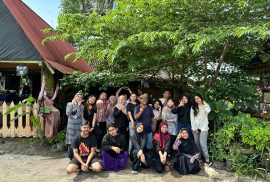Monday, May 20, 2024, UGM Vocational School together with UGM Innovation and Creativity Center (GIK) opened the INOVOKASIA 2024 Festival held from May 20, 2024 to June 1, 2024, at the UGM Vocational School. The increasing challenges of vocational needs in the future, this festival is present as a place to introduce the important role of Vocational education in the general public, including students, in the field of knowledge and skills to accelerate change and innovation in responding to technological developments. In its series of events, the INOVOKASIA 2024 Festival presents exhibition exhibitions, various competitions such as photography and poster design, workshops, talk shows, master classes, seminars, Talent Day, Movie Day, Sekip Walk, and music performances.
The festival was opened with remarks from the Dean of UGM Vocational School, Prof. Dr.-Ing. Ir. Agus Maryono, IPM, ASEAN Eng, who said the role of information technology to accelerate all knowledge that can be distributed so that change can occur. He also emphasized that Vocational students are ready to fill innovations, manufacturing works, cultural works, economic works, health works by joining hands with all faculties related to GIK. The hope of the innovation is to make Vocational School a “lighthouse” for other vocational schools by applying the movement method that has been applied by UGM Vocational School, so that one change has an impact on other changes. This model has spread to all students and lecturers, to accelerate the pace of change starting from the pattern of thinking to become more responsive to change.
In the next moment, the speech was continued by Garin Nugroho, Chief Program Officer of Gelanggang Inovasi dan Kreativitas UGM, who emphasized the importance of vocational education for the future, especially for Generation Z to answer future challenges through increasing skill capacity for the Generation Z population which amounts to more than 60% of the total population in Indonesia. On the same occasion, Garin also said the INOVOKASIA 2024 Festival invited Vocational schools across Indonesia to map the ecosystem and challenges with the aim of preparing the next generation of Indonesia.
In line with Garin Nugroho, Aji Wartono, Head of Experience at Gelanggang Inovasi dan Kreativitas UGM, also supported the organization of this festival as a place to prepare students to be able to jump directly into professional industries with vast potential and future opportunities. Aji reminded that Indonesia still has 150 manufacturing companies, the number of existing manufacturing companies is still relatively small, so further opportunities for the development of the manufacturing industry are wide open.
The opening event of the INOVOKASIA 2024 Festival can be a reference for the Faculty of Humanities UGM. Improving the quality of education and expanding student experience to prepare for the world of work according to changing industry needs is one of the goals of the Faculty of Cultural Sciences UGM to always respond to changes accurately and precisely through industry cooperation.




